Abstract
To determine reliable indicators of alcohol abuse a comprehensive set of clinical and laboratory information was acquired from three groups of subjects with a wide range of drinking histories: 131 outpatients with alcohol problems, 131 social drinkers, and 52 patients from family practice. Findings from clinical examination provided greater diagnostic accuracy than laboratory tests for detecting alcohol abuse. Logistic regression analysis produced an overall accuracy of 85-91% for clinical signs, 84-88% for items from the medical history, and 71-83% for laboratory tests in differentiating the three groups. Further analyses showed 17 clinical signs and 13 medical history items that formed a highly diagnostic instrument (alcohol clinical index) that could be used in clinical practice. A probability of alcohol abuse exceeding 0.90 was found if four or more clinical signs or four or more medical history items from the index were present. Despite recent emphasis on the laboratory diagnosis of alcohol abuse simple clinical measures seem to provide better diagnostic accuracy.
Full text
PDF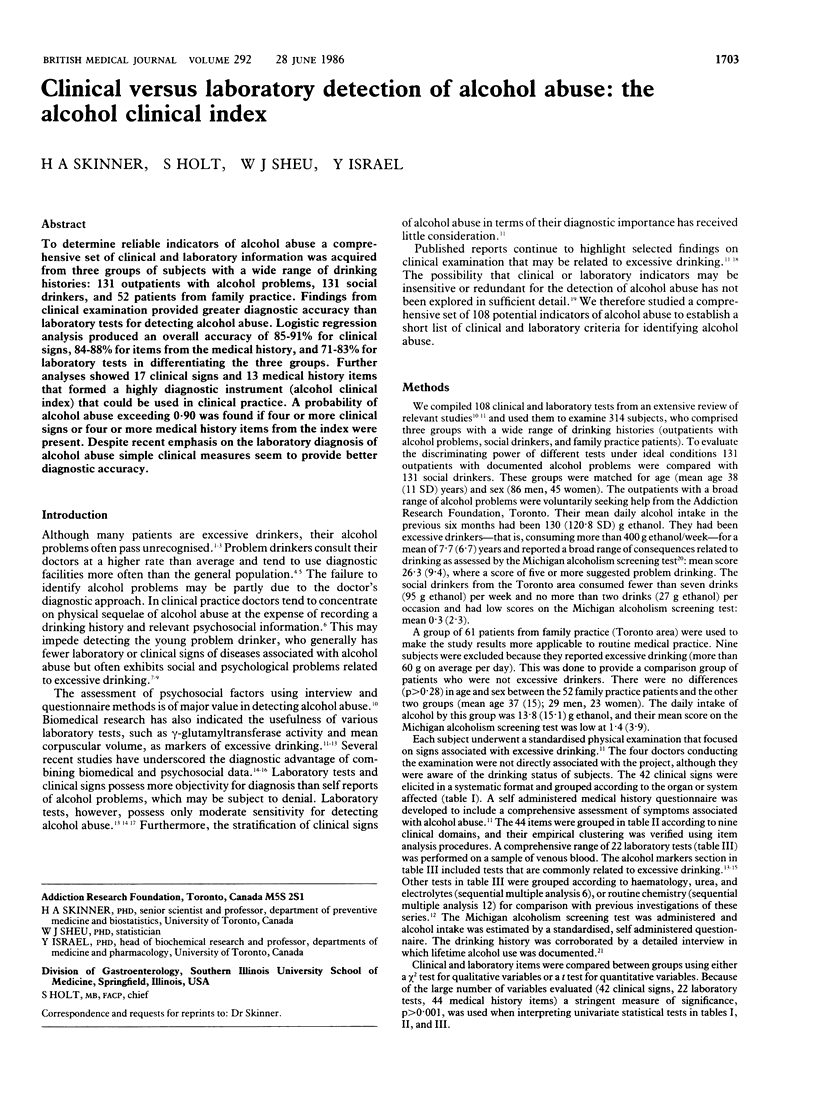
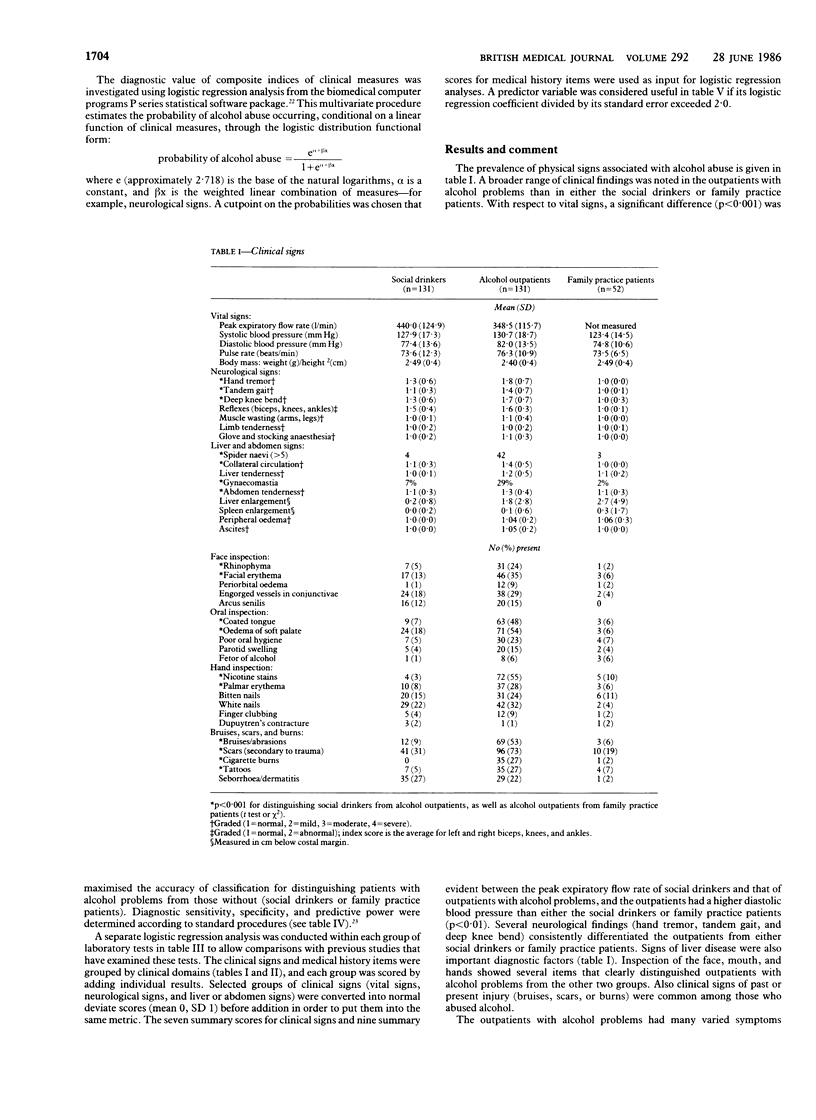
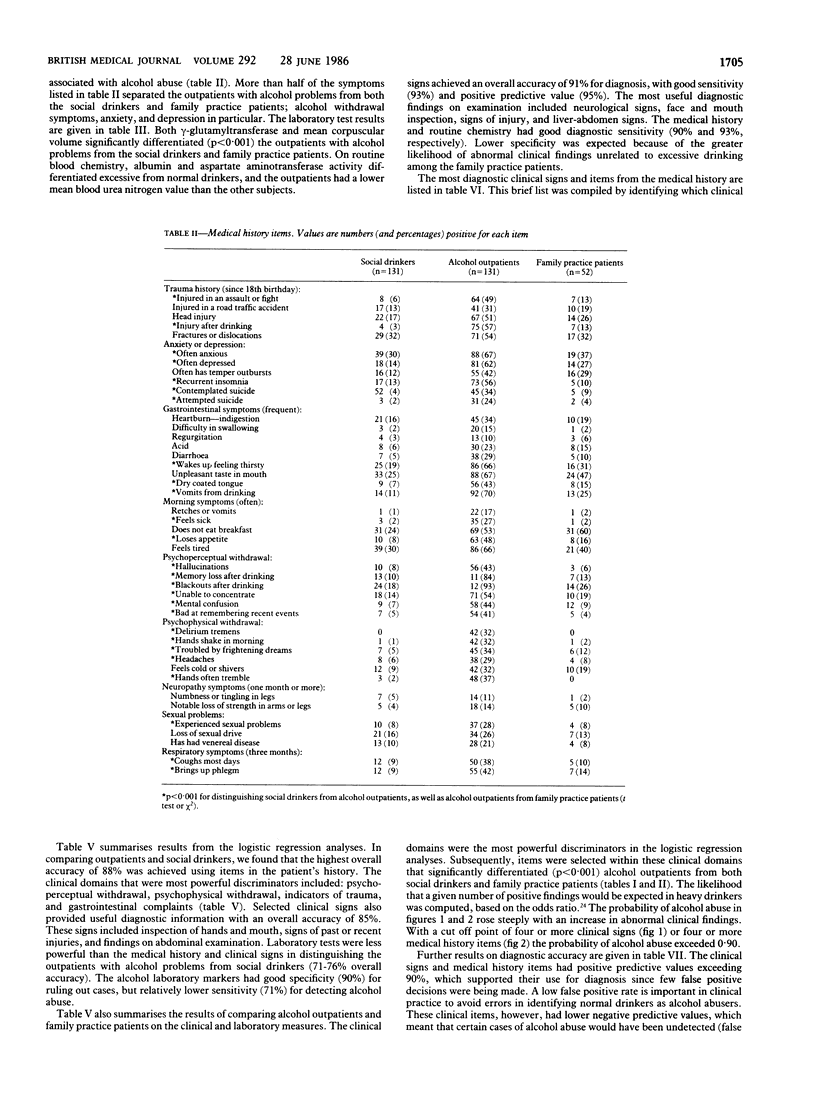
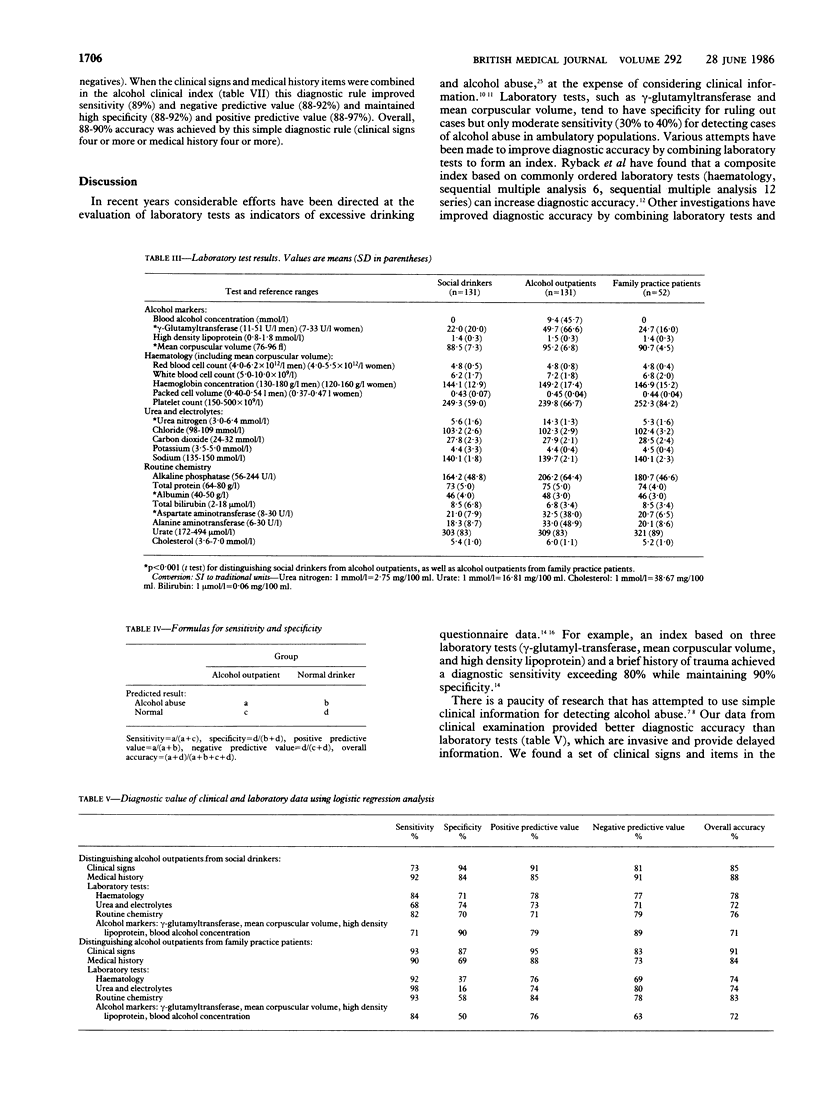
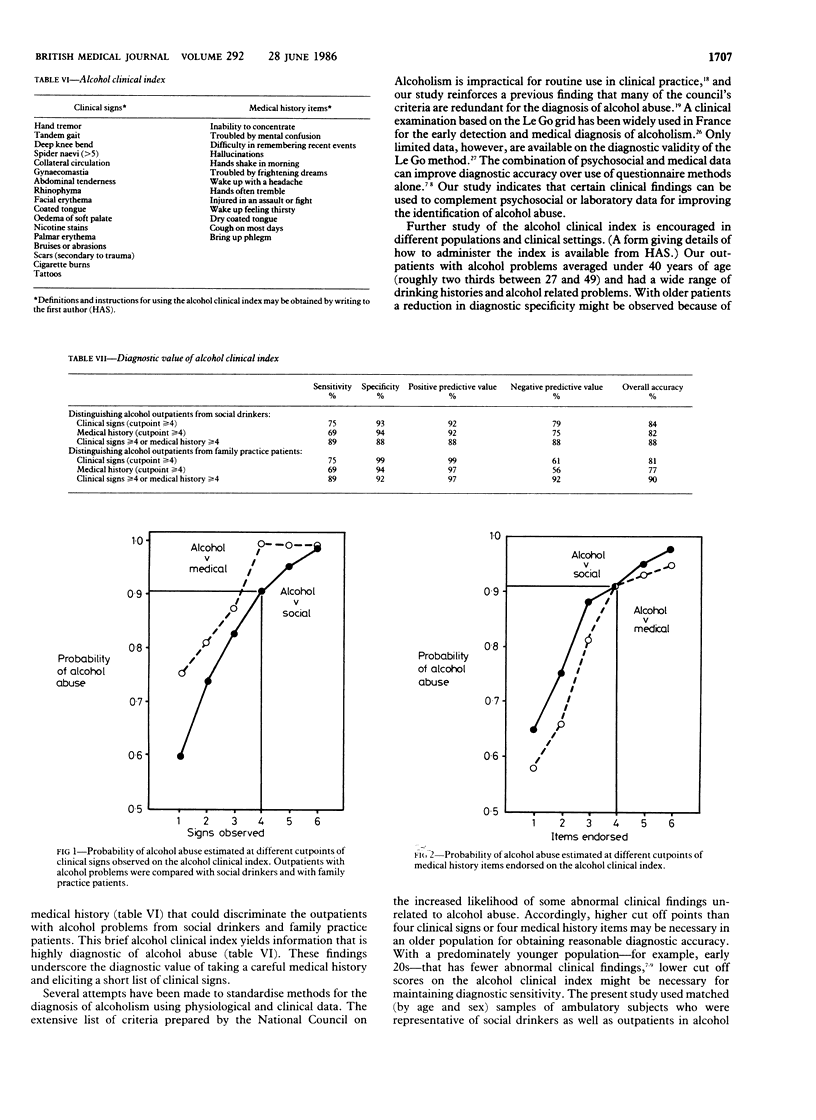
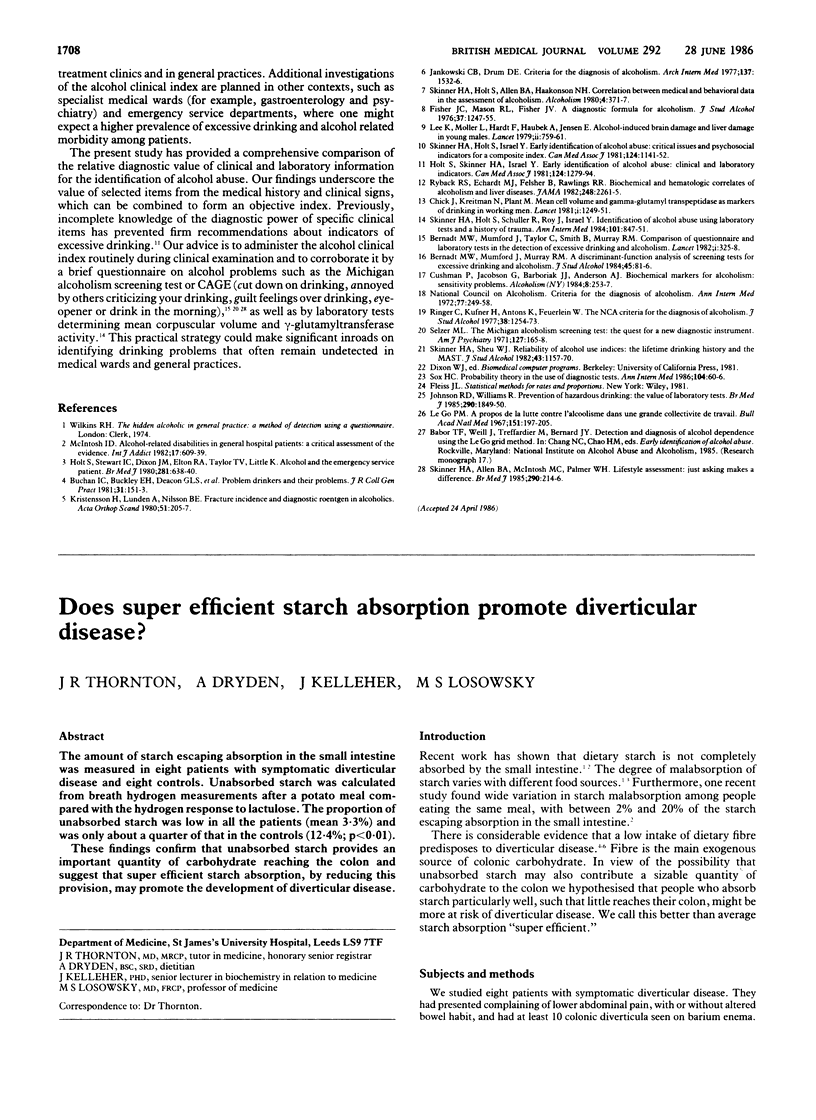
Selected References
These references are in PubMed. This may not be the complete list of references from this article.
- Buchan I. C., Buckley E. G., Deacon G. L., Irvine R., Ryan M. P. Problem drinkers and their problems. J R Coll Gen Pract. 1981 Mar;31(224):151–153. [PMC free article] [PubMed] [Google Scholar]
- Chick J., Kreitman N., Plant M. Mean cell volume and gamma-glutamyl-transpeptidase as markers of drinking in working men. Lancet. 1981 Jun 6;1(8232):1249–1251. doi: 10.1016/s0140-6736(81)92413-2. [DOI] [PubMed] [Google Scholar]
- Cushman P., Jacobson G., Barboriak J. J., Anderson A. J. Biochemical markers for alcoholism: sensitivity problems. Alcohol Clin Exp Res. 1984 May-Jun;8(3):253–257. doi: 10.1111/j.1530-0277.1984.tb05506.x. [DOI] [PubMed] [Google Scholar]
- Fisher J. C., Mason R. L., Fisher J. V. A diagnostic formula for alcoholism. J Stud Alcohol. 1976 Sep;37(9):1247–1255. doi: 10.15288/jsa.1976.37.1247. [DOI] [PubMed] [Google Scholar]
- Holt S., Skinner H. A., Israel Y. Early identification of alcohol abuse: 2: Clinical and laboratory indicators. Can Med Assoc J. 1981 May 15;124(10):1279-94, 1299. [PMC free article] [PubMed] [Google Scholar]
- Holt S., Stewart I. C., Dixon J. M., Elton R. A., Taylor T. V., Little K. Alcohol and the emergency service patient. Br Med J. 1980 Sep 6;281(6241):638–640. doi: 10.1136/bmj.281.6241.638. [DOI] [PMC free article] [PubMed] [Google Scholar]
- Jankowski C., Drum D. E. Criteria for the diagnosis of alcoholism. Arch Intern Med. 1977 Nov;137(11):1532–1536. [PubMed] [Google Scholar]
- Johnson R. D., Williams R. Prevention of hazardous drinking: the value of laboratory tests. Br Med J (Clin Res Ed) 1985 Jun 22;290(6485):1849–1850. doi: 10.1136/bmj.290.6485.1849. [DOI] [PMC free article] [PubMed] [Google Scholar]
- Kristensson H., Lundén A., Nilsson B. E. Fracture incidence and diagnostic roentgen in alcoholics. Acta Orthop Scand. 1980 Apr;51(2):205–207. doi: 10.3109/17453678008990787. [DOI] [PubMed] [Google Scholar]
- Le Gô P. M. A propos de la lutte contre l'alcoolisme dans une grande collectivité de travail. Bull Acad Natl Med. 1967 Apr 4;151(11):197–205. [PubMed] [Google Scholar]
- Lee K., Møller L., Hardt F., Haubek A., Jensen E. Alcohol-induced brain damage and liver damage in young males. Lancet. 1979 Oct 13;2(8146):759–761. doi: 10.1016/s0140-6736(79)92113-5. [DOI] [PubMed] [Google Scholar]
- McIntosh I. D. Alcohol-related disabilities in general hospital patients: a critical assessment of the evidence. Int J Addict. 1982 May;17(4):609–639. doi: 10.3109/10826088209053007. [DOI] [PubMed] [Google Scholar]
- Ryback R. S., Eckardt M. J., Felsher B., Rawlings R. R. Biochemical and hematologic correlates of alcoholism and liver disease. JAMA. 1982 Nov 12;248(18):2261–2265. [PubMed] [Google Scholar]
- Skinner H. A., Allen B. A., McIntosh M. C., Palmer W. H. Lifestyle assessment: just asking makes a difference. Br Med J (Clin Res Ed) 1985 Jan 19;290(6463):214–216. doi: 10.1136/bmj.290.6463.214. [DOI] [PMC free article] [PubMed] [Google Scholar]
- Skinner H. A., Holt S., Israel Y. Early identification of alcohol abuse: 1. Critical issues and psychosocial indicators for a composite index. Can Med Assoc J. 1981 May 1;124(9):1141–1152. [PMC free article] [PubMed] [Google Scholar]
- Skinner H. A., Holt S., Schuller R., Roy J., Israel Y. Identification of alcohol abuse using laboratory tests and a history of trauma. Ann Intern Med. 1984 Dec;101(6):847–851. doi: 10.7326/0003-4819-101-6-847. [DOI] [PubMed] [Google Scholar]
- Skinner H. A., Sheu W. J. Reliability of alcohol use indices. The Lifetime Drinking History and the MAST. J Stud Alcohol. 1982 Nov;43(11):1157–1170. doi: 10.15288/jsa.1982.43.1157. [DOI] [PubMed] [Google Scholar]
- Sox H. C., Jr Probability theory in the use of diagnostic tests. An introduction to critical study of the literature. Ann Intern Med. 1986 Jan;104(1):60–66. doi: 10.7326/0003-4819-104-1-60. [DOI] [PubMed] [Google Scholar]


